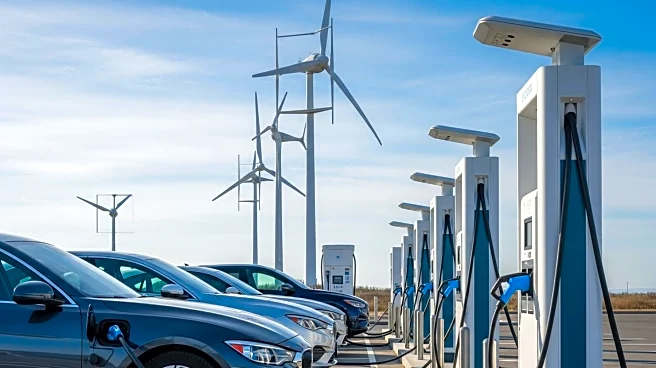What's Happening?
The U.S. Department of Energy is contemplating the revocation of $1.1 billion in funding previously awarded to Stellantis and General Motors for auto plant retooling. This decision follows the department's recent announcement to cancel $7.56 billion in financing for various energy projects deemed insufficient in providing taxpayer returns. The funding was initially granted in 2024 under President Joe Biden's administration, aimed at supporting the transition to more sustainable automotive manufacturing processes. The potential withdrawal of these grants could significantly impact the operations and future plans of Stellantis and GM, both of which have been investing in hybrid and electric vehicle technologies.
Why It's Important?
The possible revocation of funding is crucial as it underscores the Biden administration's focus on ensuring taxpayer money is effectively utilized in advancing sustainable energy initiatives. For Stellantis and GM, the loss of $1.1 billion could hinder their efforts to innovate and expand their electric vehicle production capabilities, potentially affecting their competitive edge in the rapidly evolving automotive industry. This move also reflects broader governmental scrutiny over financial allocations to ensure they align with long-term environmental and economic goals. The decision could set a precedent for future funding evaluations, impacting how automakers plan their investments in green technologies.
What's Next?
If the Department of Energy proceeds with the revocation, Stellantis and GM may need to reassess their financial strategies and project timelines. This could involve seeking alternative funding sources or adjusting their operational plans to accommodate the financial shortfall. The automakers might also engage in discussions with the government to negotiate terms or present additional evidence of the projects' potential benefits. Stakeholders, including industry leaders and environmental groups, will likely monitor the situation closely, as it could influence policy decisions and funding criteria for future automotive and energy projects.
Beyond the Headlines
The potential funding revocation highlights the complex balance between governmental oversight and corporate innovation in the pursuit of sustainable development. It raises questions about the criteria used to evaluate the effectiveness of large-scale investments in green technologies and the role of public funds in driving industry transformation. This situation may prompt broader discussions on accountability and transparency in government funding processes, as well as the need for clear metrics to assess the impact of such investments on environmental and economic objectives.










